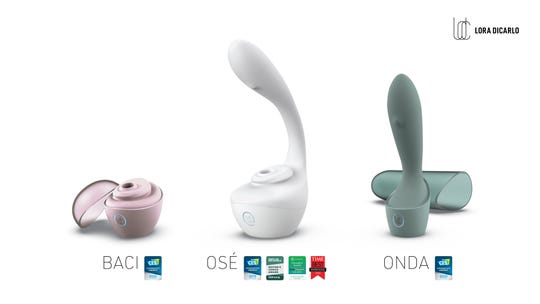Meet Lora Haddock DiCarlo. She’s the woman responsible for the return of sex toys at CES 2020
LAS VEGAS — Sex toys are back on the CES show floor. And Lora Haddock DiCarlo deserves a lot of the credit.
“We want to reshape how people think about sex tech,” says the CEO and founder of the company that bears her name and markets such products.
“We shamed pleasure (tech) for so long,” she says. “The fact is that sexual health and wellness (products) are health and wellness products.”
That’s the category under which the Consumer Technology Association (CTA), which organizes the event, is letting such companies exhibit at the 2020 industry shindig. But it took some convincing.
In DiCarlo’s telling, the backstory begins with an orgasm, leading to the company’s first in a family of hands-free robotic massagers called Osé. Osé emerged in partnership with the robotics lab at Oregon State University, which, DiCarlo points out, included several female engineers.
Sex tech for women from Lora DiCarlo (Photo: Lora DiCarlo)
Her company applied for and was granted a CES innovation award for the prototype that was Osé, stating up-front that the product is meant to stimulate a woman’s G-spot and clitoris. But about a month later, when Lora DiCarlo asked for Osé to be included in a product showcase at CES and to exhibit at the show, the CTA took the award away on the grounds, DiCarlo says, that they found it “immoral, obscene, and profane.”
What to expect at CES 2020: Ivanka Trump, flying cars, sex toys and 8K TVs – oh my!
A backlash ensued over the sexist stance toward the female-focused product, and the CTA eventually bowed to the pressure. It not only apologized to DiCarlo and reversed its reversal of the award, but began a dialogue with her that resulted in a new policy, opening up floor space in the health and wellness area for such sex tech exhibitors.
The ban actually raised DiCarlo’s profile and, while not necessarily the route she would have chosen, has been good for business. She pre-sold more than 10,000 Osé units in December (at $290 each), and has tripled the size of the company. At CES 2020, DiCarlo’s company will unveil two new bio-mimetic pleasure devices under the names Baci and Onda.
Lora Haddock DiCarlo (Photo: Lora DiCarlo)
Controversy over sex is nothing new for CES. In its earliest days, the show incorporated members of the porn industry.
The Adult Entertainment Expo eventually became its own event, though for some years it ran concurrently with CES, though not presently.
Aside from that, many companies at CES have employed attractive scantily clad “booth babes,” the term coined for women whose job it is to lure foot traffic to a mostly male audience. The CTA has said it maintains the right to remove people wearing what it considers inappropriate attire.
Critics of the show have also complained through the years about the lack of inclusiveness when it comes to speaking roles, with most prominent keynote slots given to male executives.
For her part, DiCarlo says the inclusion of sex tech exhibitors is all about normalizing the way people talk about a subject deemed by some as off-limits. “We believe that having open conversations about our bodies and human sexuality is the right thing to do,” she says.
Still, it will be worth watching over the next several days the kind of response sex tech actually gets.
“The big question for me is how brands will talk and position these gadgets,” says Carolina Milanesi, an analyst with Creative Strategies. “Will it be about women, their pleasure and health or, as we very often see, the gadgets marketed will be about men?”
Email: [email protected]; Follow @edbaig on Twitter.
Source: Read Full Article

